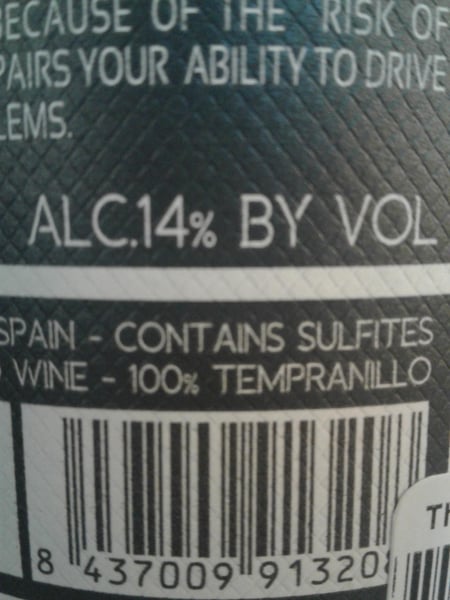This isn't a subject that comes up often when I'm serving wine, but when it does, one thing is apparent: no one knows what sulfites are or why they are in our wine. Despite that fact, I often hear them blamed for a wide array of wine-related ailments. Admittedly, I didn't know much about it either, and I couldn't figure out why all those evil winemakers were trying to poison us. It seems like kind of a big deal so I decided to look into it.
First of all, if you don't know what I'm talking about, go pick up any bottle of wine and turn it over to read the back label, chances are, somewhere you'll find the words, “Contains Sulfites." If you don't see that on the label, one of three things is probably happening:
- Your bottle came from outside the United States or European Union and was not imported for resale.
- The wine is organic and sulfur dioxide occurs in less than 10 parts per million.
- Your wine wasn't labeled properly.

So, what are these “sulfites” and why are they being added to our wine? Specifically, we're looking at sulfur dioxide, a chemical compound which occurs naturally in small amounts during the fermentation process. However, it's also added to wine to prevent oxidation, kill bacteria and unwanted yeast, as well as being used by winemakers as a cleaning and sanitizing agent, because other cleaners can promote cork taint.
Also, it seems I may be required to tell you the Romans burned sulfur candles in empty wine vessels to preserve their wine. I say that because nearly every source I read in researching this topic went out of their way to include that fact... and now I have too.
Beyond wine, sulfites are used in a wide array of fruit and vegetable products for the same reason. It's why the presliced apples you see in packages aren't brown and disgusting, even though you know they should be. Generally, the sulfite content of dried fruits and vegetables is greater than what you would find in any wine.
In 1988, the U.S. required any wine containing SO2 in quantities greater than 10ppm to include the words “Contains Sulfites” on the label. This was introduced to protect a small percentage of the population (around 1%) with allergies to sulfites. The thing is, at the time the law went into effect, no wines were being produced with less than 10ppm. Many wines produce concentrations that great as a result of fermentation, without the addition of SO2 as a preservative.
As every wine label in the country changed, concerns from consumers, producers, and merchants arose. Consumers wanted to know why the industry was suddenly adding these strange chemicals into their beloved wine, the producers wanted consumers to know nothing had changed except industry labeling regulations, and merchants wanted people to keep buying wine. Thirty years later, I don't know if anyone got what they wanted. Starting in 1988, wine sales declined for the next six years until 1993 when the numbers finally started to climb again. It was another thirteen years, 2006, before sales reached the the level they had been before this labeling regulation was enacted.
In the years since the labeling standards were established, there has been an organic food revolution and any chemical added to a product is viewed with suspicion. As a result, more and more winemakers in the US have adopted organic and biodynamic agricultural practices. One movement within the industry strives to ensure no additional SO2 is added to their wines, though it may still contain more than 10ppm due to what occurs naturally in fermentation. The upside to this practice is that some of these wines are reported to be more “alive” than their counterparts, although some also take on unpleasant flavors from rogue yeasts that additional SO2 would usually kill. At present, it still seems a risky endeavor.
Three decades after the new labeling regulations were put in place, there's still debate about how significant of a role SO2 should play in wine. What we do know is there is no research correlating it to hangovers or “red wine headaches,” even for those who are allergic to sulfites, those aren't symptoms. Is it dangerous? In large concentrations, yes, it can be, but the same is true of alcohol. In fact, weren't the adverse effects linked to moderate alcohol consumption part of the reason you were buying wine to begin with? So, stop worrying, be responsible, and just enjoy your glass of wine, that's what it's there for.
If you want to learn more about wine, be sure to check out The Chopping Block's upcoming wine classes with our two new sommeliers: Mary Ross and Christophe Bakunas.
